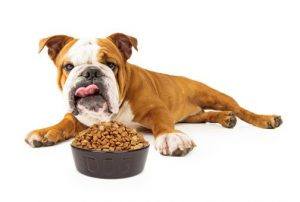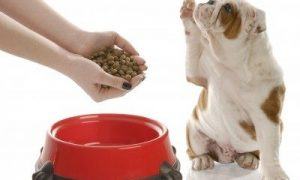“This post contains affiliate links, and I will be compensated if you make a purchase after clicking on my links.”

Has your pooch been scratching and itching? Does he seem to have poor coat quality and recurring ear infections? It’s very likely that you’re contributing to Fido’s distress without being aware of the possibility that he might actually becoming allergic to the food that you’ve been feeding him. Food allergy is just one of the rising concerns with dog lovers nowadays, and it appears more and more pooches are putting up with this health issue.
A Brief Overview
Canine food allergy generally refers to the over response of a dog’s immune system to an overrunning protein normally found in his food. While many people often recognize that meats are a protein source, it’s important to bear in mind that some grains and veggies can also be a source of protein. Any of these can be a potential trigger of food allergy. However, there are several dog breeds that have been found to be naturally prone to this kind of health problem. These most commonly include Springer Spaniels, Cocker Spaniels, Boxers, Collies, German Shepherds, Dalmatian, Lhasa Apso, Retrievers, Miniature Schnauzers, Shar Peis, Dachshunds, Soft-coated Wheaten Terriers, and West Highland White Terriers.
While some of the most common sources of food allergens in dogs are dairy, beef, chicken, and wheat products, the least common, on the other hand, include rabbit and fish. Your pet might be suffering from some form of allergy if he/she shows the following general signs and symptoms: dry, itchy skin; bald patches; excessive licking or scratching; skin infections; ear infections; high frequency of hot spots; vomiting; and diarrhea.
How to Handle the Problem
· Introduce a special diet. First, ensure that your pooch’s symptoms indeed point to food allergy by consulting your veterinarian. Should this be the case, your vet will most likely recommend that you take a crack at an elimination diet. This is when you feed your dog foods that have a different protein source and another different carbohydrate source than what your pet has had before. Some of the usual anti-allergy foods are those considered to be novel protein sources such as oatmeal and kangaroo or potato and venison. This will help prevent the dog’s immune response from becoming triggered again and again. In addition, your vet might also recommend that you also give a hypoallergenic diet a try. These kinds of foods are basically made with hydrolysed proteins which prevent an immune response by breaking the proteins down into pieces; thereby, keeping it from binding with IgA. Some of the commonly considered hypoallergenic foods are rice and lamb.
· Be mindful of what Fido eats. While your pooch is on any of these special diets, it’s crucial that he does not get any other food like treats, cookies, table scraps, and rawhides. Because you’re not yet sure what exactly he is allergic to, try your best to avoid giving him anything that might trigger an allergic reaction. Now, the moment you have gotten your pet on a food that you’re certain he will not react to, you can begin reintroducing other doggie foods and treats. If he reacts, you will then know which food exactly has caused the problem and can avoid it in the future.
· Treat his Symptoms. The symptoms of a food allergy can be irritating to your dog at best, and excruciating at worst. Your veterinarian can prescribe certain medications, like antihistimines or steroids, to reduce inflammation and make your dog more comfortable. If your dog has a known food allergy, it’s a good idea to keep these medications on hand, should he accidentally ingest some of his forbidden foods.
· Read the Labels. Once you discover which ingredient has caused your dog’s allergic reaction, you’ll need to be diligent in reading food labels. Chicken, wheat, and soy are very commonly used in a variety of dog foods and treats, even though they might not be listed on the front of the bag. Many foods, even very high quality trusted brands, use chicken for added protein, while the food may be named for another recipe. If you have an allergic dog, you’ll want to know exactly what he’s eating at every meal or snack time.















kelly
Mar 28, 2013 at 7:47 pm
We had allergy panel testing for my Dane, she is allergic to all proteins but eggs and liver. She is least reactive to the grains that most dogs are highly allergic to. She is allergic to fish, potato. I have searched for an alternative than the prescription diet, I hate feeding her that but it is the only thing I have found. I need a good vegetarian diet that I can add eggs and liver to . Why is it so hard to get good nutritious food for our dogs!
Quyen Pham
Sep 1, 2014 at 10:09 pm
Can you tell me if the panel blood work was expensive at all? I wanted to see to help my Fuzzy but it cpvery costly thru my vet. Thank you.
Kim
Mar 28, 2013 at 5:08 pm
Kangaroo dog food? 🙁 Really? Yikes..I wonder what country/how kangaroo is sourced. Finding out where food sources come from is equally as important.
*Organic, sourced from the USA, might be the factor that needs to change in alot of these cases- so, maybe not an allergy to a specific protein or grain, but a reaction to a poor quality/tainted/chemical-laden product.
I just read the article that dog foods with fish as an ingredient are almost always PROCESSED in China, for example.
kris z
Mar 28, 2013 at 3:34 pm
get them off wheat/soy/grains of any kind. i did a raw diet (just ground chicken (bones and all) for the most part. i have added green beans to it and occasionally beef or lamb or pork. since i took them off kibble 12 yrs ago things are much better. there are some decent no grain kibble too you can try. stay as far away from vet ‘prescription’ diets as possible..
Adoption Revolution
Feb 19, 2013 at 3:32 pm
I found It’s really important to be diligent with the elimination diet…then afterwards you andyour dog will be so much happier!!
Please help me save some shelter dogs…please “like” facebook.com/AdoptionRevolution Thanks